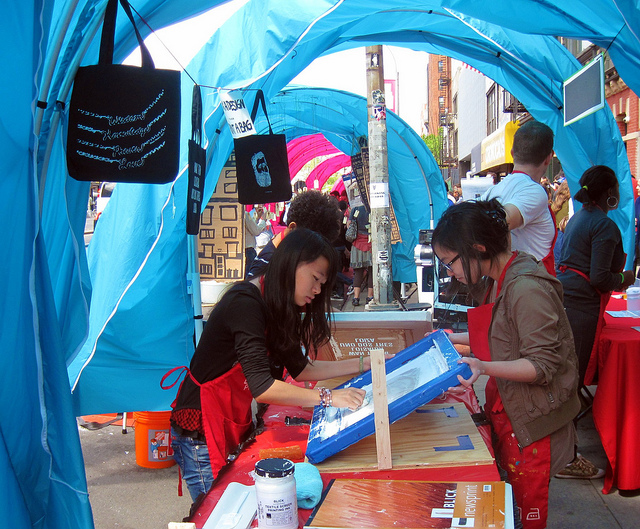“As world-renowned American psychologist Charles Schaefer says, ‘we are never more fully alive, more completely ourselves, or more deeply engrossed in anything, than when we are at play.’ The city itself has long been conceptualized as a ‘playground,’ and play is an inescapable part of our current cities, which are a hybrid of physical and electronic spaces. How can play and gaming assist us in reimagining and co-creating urban environments, foster deeper engagement, propel education, and provide solutions to urban problems?” — from IDEAS CITY, a four day exploration of the future of cities, held in Lower Manhattan from May 1 – 4, 2013, organized by the New Museum.
What does “Play” have to do with Untapped Capital? According to a diverse and dynamic set of panelists at IDEAS CITY, a whole lot.
Designers, researchers and creators Kemi Ilesanmi, Charles Renfro, Eric Zimmerman, and Constance Steinkuehler, joined by moderator Yancey Strickler, come from pretty distinct backgrounds. Kemi runs the Laundromat Project, which transforms community laundromats into havens of artistic expression led by neighborhood artists; Charles was one of the architects who designed the High Line; Eric is a game designer and professor of game design at NYU; Constance is a games and education researcher at the University of Wisconsin; and Yancey is one of the co-founders of Kickstarter.
They’ve each spent significant amounts of time thinking about play and what it allows us to do.
Through their individual speeches and their complementary visions, they made a hugely compelling case for the importance of play. Eric proposed that we think of play with reference to the free play of a steering wheel. It is the movement of the steering wheel before it affects the rest of the system; what exists because and despite of the systems that are meant to determine its behavior. As we rearrange the boundaries of these systems in productive conflict, we make meaning out of our actions, seeing them through different lenses.
Charles suggested that the city is one such system, and that at its best it encourages the play of exploration and the re-making of meaning. In designing the High Line, his team sought to create a space that “rescripts the city by de-scripting it,” “provoking behaviors without knowing what exactly it provokes.” The space invites a certain set of behaviors, but more than that it invites us to re-visit and re-view our engagement with the space itself and with the city that surrounds it.
Kemi picked up this notion of the role of play in re-envisioning our cities. She spoke of the work they do in the Laundromat Project, which consists largely of transforming underused spaces like community laundromats into playgrounds of artistic expression. In their work, they focus on the importance of low-stake engagement with alternative possibilities. They create spaces within which neighbors can play with what could be. They do this because they believe play unlocks human potential, that most underutilized of resources.
And this is exactly what Constance researches. She focuses on how playing can help young people learn more effectively. In her research, she has shown that learners who read below grade-level in school reading tasks almost always perform at least two grade-levels better than expected when these reading tasks are in the context of a game. For her, this has everything to do with play. Part of how play unlocks potential is through voluntary engagement. No one plays because they have to. We play because we want to, and when we want to do something, we excel at it. This, Constance said, is why play is so important.
If we bring it all together, we can see that play might indeed have something important to say about untapped capital. It is how we unlock some of our human potential and begin to explore the alternative possibilities embedded in our cities. It is how we re-envision where we are and where we could be, both individually and collectively. This vision, in turn, is crucial to the process of co-creating a future that works for everyone.
Image: The Laundromat Project at the IDEAS CITY Festival
